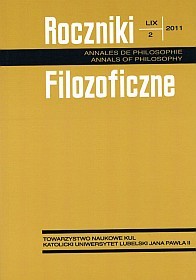The Role of the Downward Causality and of Biological Convergence in the Evolution of the Universe
Abstract
In traditional debates concerning the process of evolution the naïve teleological explanations were replaced by deterministic ones. New discoveries in quantum cosmology and quantum mechanics contributed to recognition of the cognitive value of teleological and quasi-teleological interpretations. In polemics dealing with cosmic evolution, the main explanatory function is played by the concept of downward causality which explains the emergence of new cosmic structures (G.F.R. Ellis, Paul P. Davies). A similar quasi-theological factor appears in Simon Conway Morris’ concept of biological convergence. After adopting this new cognitive perspective, one could explain many problems of evolutionary science that had no satisfactory explanation in earlier scientific debates.
References
Aikman D.: The Delusion of Disbelief, Tyndal House: Carol Stream 2007.
Barrow J.D., Tipler F.J.: The Anthropic Cosmological Principle, Oxford: Clarendon Press 1986.
Campbell D.T., Downward Causation in Hierarchically Organized Systems, [w:] F. Ayala, T. Dobzhansky (eds.), Studies in the Philosophy of Biology: Reduction and Related Problems, London: Macmillan 1974, s. 179-186.
Conway Morris S.: Life’s Solution. Inevitable Humans in a Lonely Universe, Cambridge: Cambridge University Press 2003.
Davies P.: Cosmic Blueprint, London: William Heinemann 1987.
Davies P.: The Physics of Downward Causation, [w:] P. Clayton, P.S. Davies (eds.), The Re-Emergence of Emergence, Oxford: Oxford University Press 2006, s. 35-52.
Ellis G.F.R.: On the Nature of Emergent Reality, [w:] P. Clayton, P.S. Davies (eds.), The Re-Emergence of Emergence, Oxford: Oxford University Press 2006.
Fuliński A.: Fizyka a wolny wybór, [w:] Nauka. Religia. Dzieje, Kraków: Wyd. UJ 1998, s. 45-56.
Heller M.: Koncepcja wielu wszechświatów – nauka czy fantazja?, [w:] M. Heller, J. Mączka, P. Polak, M. Szczerbińska-Polak (red.), Prawa przyrody, Kraków–Tarnów: OBI–Biblos 2008.
Kochański Z.: Problem celowości we współczesnej biologii, „Studia Filozoficzne” 10 (1959).
Marshall D.: The Truth behind the New Atheism, Eugene, OR: Harvest House Publishers 2007.
Monod J.: Leçon inaugurale, Paris: Collège de France 1968.
Stoeger W.: The Immanent Directionality of the Evolutionary Process, and Its Relationship to Theology, [w:] R.J. Russell (ed.), Evolutionary and Molecular Biology, Città del Vaticano: Vatican Observatory 1998.
Copyright (c) 2011 Roczniki Filozoficzne

This work is licensed under a Creative Commons Attribution-NonCommercial-NoDerivatives 4.0 International License.





